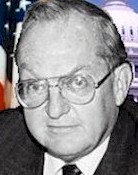
Rep. Bliley
Bliley Introduces Database Bill
(May 23, 1999) Rep. Tom Bliley introduced the Consumer and Investor Access to Information Act on May 19, 1999. In contrast to Rep. Howard Coble's bill, Rep. Bliley's bill would provide only limited protections for the developers and owners and databases.
 |
|
Rep. Bliley |
HR 1858 IH was introduced on Wednesday, May 19, by most of the leadership of the House Commerce Committee. The lead sponsor is Rep. Tom Bliley (R-VA), the Chairman of the full committee. The initial cosponsors are Rep. John Dingell (D-MI), the Ranking Minority Member of the full committee, Rep. Billy Tauzin (R-LA), the Chairman of the Telecommunications Subcommittee, Rep. Ed Markey (D-MA), the Ranking Minority Member of the Telecommunications Subcommittee, Rep. Mike Oxley (R-OH), and Rep. Edolphus Towns (D-NY).
HR 1858 would offer some protection to the builders of databases. Database owners and developers currently are unable to protect their databases from piracy under either copyright or contract law. The problem was created by the U.S. Supreme Court's rejection of the "sweat of the brow" basis for protecting compilations of data under copyright law in the case Feist Publications v. Rural Telephone Service Co., 449 U.S. 340 (1991).
| See, Summary of Bills Pertaining to Protecting Databases. |
Rep. Howard Coble (R-NC), the Chairman of the House Courts and Intellectual Property Subcommittee, has been trying to pass a database protection bill for years. He sponsored HR 2652 in the 105th Congress (1997-1998); it passed the House by a voice vote on May 21, 1998; however, it did not not pass the Senate, and lapsed.
Related Documents |
| HR 1858 IH, the Consumer and Investor Access to Information Act (Bliley). |
| HR 354 IH, the Collections of Information Anti-Piracy Act (Coble). |
| Feist Publications v. Rural Telephone Service Co., (Supreme Court). |
He is sponsoring a very similar bill in the current Congress, HR 354, the Collections of Information Anti-Piracy Act. His bill would give database owners a private cause of action against pirates which is similar to the unfair competition remedies of the Lanham Act.
Rep. Bliley's bill provides lesser protection for database owners, and far less legal remedies. It states that "It is unlawful for any person ... to sell or distribute to the public a database that--(1) is a duplicate of another database ... and (2) is sold or distributed in commerce in competition with that other database." However, there are numerous exemptions and exceptions, including the following:
Moreover, this bill provides very little recourse for database owners and developers whose databases have been duplicated. There is no private right of action. The database developer or owner would not have the right to bring suit to enjoin violations or recover damages, or to seek any other remedy. The only exception would be for the processors of "real-time market information" databases.
 |
|
Rep. Coble |
Enforcement of the provisions of the Bliley bill is left to the Federal Trade Commission. The FTC is a consumer protection agency, without expertise in intellectual property matters, without substantial enforcement powers, and without the resources to handle a large influx of new cases. Moreover, it would have authority only to initiate civil proceeding for unfair or deceptive acts under the Federal Trade Commission Act.
HR 1858 has been referred to the House Commerce Committee. HR 354, like its predecessor in the 105th Congress, has been referred to the House Judiciary Committee. Rep. Coble's Courts and Intellectual Property Subcommittee has held three hearings in this and the prior Congress. On May 20, HR 354 was approved by unanimous voice vote by the subcommittee. On May 26, the full Judiciary Committee approved HR 354.
| Tech Law Journal Stories |
| Hearing on Database Protection Bill, 2/12/98. HR 2652 Passes Subcommittee, 3/18/98. Judiciary Committee Approves HR 2652, 3/25/98. House Passes Database Protection Bill, 5/21/98. Coble Re-introduces Database Protection Bill, 1/22/99. House Subcommittee Holds Hearing on HR 354, 3/19/99. |